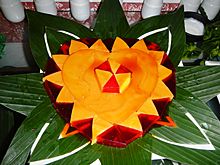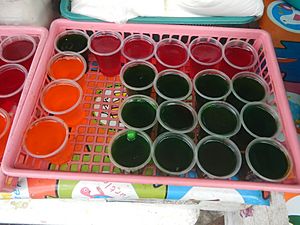Gulaman facts for kids

A dessert made from leche flan and gulaman from Baliuag, Bulacan
|
|
| Course | Dessert |
|---|---|
| Place of origin | Philippines |
| Serving temperature | Cold |
| Main ingredients | Agar |
Gulaman is a special ingredient from the Philippines. It's like a plant-based jelly that comes in bars or powder. People use it to make yummy desserts. It's also the name for a popular cold drink called sago't gulaman. You can often find this refreshing drink sold by street vendors.
What is Gulaman?
Gulaman is made from agar, which comes from special types of seaweed. Some of these seaweeds, like Gracilaria, Eucheuma, and Kappaphycus alvarezii, are grown on farms in the Philippines.
You can buy gulaman as long, dry bars, sometimes plain or colored. It's also sold as a powder, which is easy to use.
How is Gulaman Used?
Gulaman is a key ingredient in many Filipino treats. It's used in popular drinks and desserts like sago at gulaman, buko pandan, and the famous halo-halo. You'll also find it in fruit cocktail jellies and different kinds of Filipino fruit salads.
Gulaman vs. Gelatin
The words "gelatin" and "gulaman" are often used to mean the same thing in the Philippines. However, they are actually quite different!
Gelatin comes from animal protein. But gulaman is a plant-based ingredient made from seaweed. This means gulaman is a great choice for people who don't eat animal products, like Muslims or vegans.
Another big difference is how they set. Gelatin dissolves in hot water and needs to be cold to set. Gulaman needs boiling water to dissolve, but it can set at room temperature. Also, if gelatin melts, it can't go back to its original shape, but gulaman can.
 | Charles R. Drew |
 | Benjamin Banneker |
 | Jane C. Wright |
 | Roger Arliner Young |


